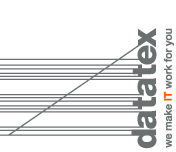
Klopman. A leading global manufacturer of technical work fabrics
Interview with Pierluigi Trillò – Information Technology Director at Klopman International

KLOPMAN INTERNATIONAL – A major textile company founded in 1967, Klopman International is Europe’s leading manufacturer and marketer of technical textiles for workwear. Headquartered in Frosinone, Italy, where more than 400 employees work, with a turnover of about 150 million euros, it also has a production plant in Jakarta, Indonesia, and offices and sales branches in Bangkok, Borås (Sweden), Dubai, Düsseldorf, Lyon and Moscow.
1) Klopman International is the leading European manufacturer of polycotton fabrics for workwear, protective clothing and casual wear. How did the company start and how has it evolved over the years to become the European leader in the industry? What are your flagship products and the key features – in terms of technological innovation – of your fabrics?
The company has been a European market leader for over 50 years, and over the years has developed a range of over 150 catalog products grouped into 3 different categories:
– Workwear fabrics, developed to meet the daily needs of all types of workers, which include polyester/cotton fabrics, cotton-majority fabrics, stretch fabrics, and fabrics with Tencel™ fiber.
– Protective clothing fabrics, specially designed for use in functional PPE clothing (to protect the worker’s body from injury during occupational activities) and conforming to international standards.
– Corporatewear fabrics: from denim to outdoor fabrics, from apparel to casual fabrics for work fashion.
These are joined by the new range of Greenwear™ fabrics, which includes all products made from sustainable raw materials, such as recycled polyester, organic cotton, Better Cotton and Fairtrade cotton, as well as the industry’s latest innovation, represented by a fabric made from fiber derived from recycled end-of-life garments.
2) Pandemic, crisis in global textile supply chains, rising costs of raw materials, logistics and transportation, energy crisis and rising costs of gas and energy-the last few years have not been easy for textile industries and more generally for the manufacturing and industrial production sphere. How has a large company like Klopman coped with these emergencies?
Klopman produces more than 40 million meters of fabrics in the heart of Italy. The quality of our fabrics and customer service has made our fortune over the years, and these are the cornerstones at the heart of our business model. These have been challenging years that we have just gone through, in so many ways, and the energy crisis that came after a two-year pandemic was certainly a heavy contingency, one that put a strain on the whole world. We faced the critical issues before us with our trademark determination and seriousness, and today we can begin to see the first, tentative signs of a brighter future.
3) In the role of IT Director of an important industrial group like Klopman, one finds himself daily experiencing the evolution of companies from the point of view of digitalization and the 4.0 revolution. From an IT point of view, how have textile companies changed over the years? On this front, what do you think were the most significant innovations, those that had the most profound impact on the way production was managed?
The automation of business processes and the acceleration of digitization are setting the stage for a future that is now just around the corner. Textile companies are not exempt from this ongoing revolution. Everything that was paper is now encapsulated in data that accelerates and drives business decisions.
At Klopman we are proud of the work we are doing because we are laying the foundation for new ways of working, increasingly efficient, more sustainable, and aimed more at transparency and customer satisfaction.
4) Klopman is followed on the IT side by Datatex and works with NOW, the world’s best-selling vertical management software for textile industries. What do you think are the most interesting strengths and features of NOW?
The main strength of the NOW ERP system lies both in being a management system strongly oriented to the world of textiles, and in the efficiency of Datatex, which is able to best support the customer in dealing with the specific needs peculiar to our sector.
In these almost seven years of collaboration, starting with the implementation of the NOW ERP in Klopman, the companies have grown in mutual experience, thanks also to the strong know-how of a historical industrial reality like Klopman.
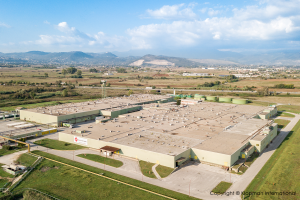
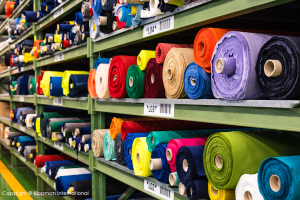
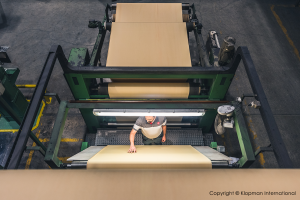
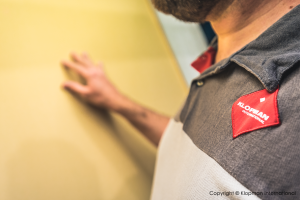
ITA
Klopman. L’azienda leader nei tessuti tecnici da lavoro
Intervista a Pierluigi Trillò – Information Technology Director presso Klopman International
KLOPMAN INTERNATIONAL – Importante azienda tessile fondata nel 1967, Klopman International è la società europea leader nella produzione e commercializzazione di tessuti tecnici per abbigliamento da lavoro. Ha sede centrale in Italia, a Frosinone, dove operano oltre 400 dipendenti, per un fatturato di circa 150 milioni di euro, e ha inoltre uno stabilimento di produzione a Giacarta, in Indonesia, e uffici e filiali commerciali a Bangkok, Borås (Svezia), Dubai, Düsseldorf, Lione e Mosca.
1) Klopman International è il principale produttore europeo di tessuti in policotone per abbigliamento da lavoro, abbigliamento protettivo e casual. Come nasce l’azienda e come si è evoluta negli anni fino a raggiungere la leadership europea nel comparto? Quali sono i vostri prodotti di punta e le caratteristiche fondamentali – sul piano dell’innovazione tecnologica – dei vostri tessuti?
L’azienda è da oltre 50 anni leader di mercato a livello europeo, e negli anni ha sviluppato una gamma di oltre 150 prodotti a catalogo raggruppati in 3 diverse categorie:
- Tessuti per abbigliamento da lavoro, sviluppati per soddisfare le esigenze quotidiane di ogni tipo di lavoratore, che comprendono tessuti in poliestere/cotone, tessuti a maggioranza di cotone, elasticizzati e con fibra Tencel™.
- Tessuti per l’abbigliamento protettivo, appositamente progettati per l’uso in indumenti funzionali DPI (per proteggere il corpo del lavoratore da lesioni durante le attività professionali) e conformi agli standard internazionali.
- Tessuti corporatewear: dal denim ai tessuti per l’outdoor, dall’abbigliamento ai tessuti casual per la moda lavoro.
A questi si aggiunge la nuova gamma di tessuti Greenwear™, che comprende tutti i prodotti realizzati con materie prime sostenibili, come il poliestere riciclato, il cotone organico, il Better Cotton e il cotone Fairtrade, oltre all’ultima innovazione del settore, rappresentata da un tessuto realizzato con fibra derivante dal riciclo di capi al termine del loro ciclo di vita.
2) Pandemia, crisi delle supply chain tessili globali, aumento dei costi delle materie prime, della logistica e dei trasporti, crisi energetica e incremento dei costi di gas e energia: gli ultimi anni non sono stati semplici per le industrie del settore tessile e più in generale per l’ambito manifatturiero e della produzione industriale. In che modo una grande azienda come Klopman ha fronteggiato queste emergenze?
Klopman produce oltre 40 milioni di metri di tessuti nel cuore dell’Italia. La qualità dei nostri tessuti e del servizio clienti ha fatto la nostra fortuna negli anni, e sono questi gli elementi cardine alla base del nostro modello di business. Sono stati anni sfidanti quelli che abbiamo appena attraversato, sotto tanti punti di vista, e la crisi energetica arrivata dopo due anni di pandemia è stata sicuramente una contingenza pesante, che ha messo a dura prova il mondo intero. Abbiamo affrontato le criticità che ci si sono poste dinanzi con la determinazione e la serietà che ci contraddistinguono, e oggi possiamo iniziare a vedere i primi, timidi segnali di un futuro più roseo.
3) Nel ruolo di IT Director di un Gruppo industriale importante come Klopman si trova quotidianamente a toccare con mano l’evoluzione delle aziende dal punto di vista della digitalizzazione e della rivoluzione 4.0. Sul piano informatico come sono cambiate negli anni le aziende tessili? Su questo fronte quali sono state secondo lei le innovazioni più significative, quelle che hanno inciso più profondamente sul modo di gestire la produzione?
L’automazione dei processi aziendali e l’accelerazione della digitalizzazione stanno ponendo le basi di un futuro che è ormai dietro l’angolo. Le aziende tessili non sono esenti da questa rivoluzione in atto. Tutto ciò che era carta è oggi racchiuso in dati che accelerano e guidano le scelte aziendali.
In Klopman siamo orgogliosi del lavoro svolto perché stiamo gettando le fondamenta per nuovo modo di lavorare, sempre più efficiente, più sostenibile, e volto maggiormente alla trasparenza e alla soddisfazione del cliente.
4) Klopman è seguita sul piano informatico da Datatex e da Datasys Network e lavora con NOW ERP by Datatex, il software gestionale verticale per le industrie tessili più venduto nel mondo. Quali sono secondo lei i punti di forza e le caratteristiche più interessanti di NOW?
Il principale punto di forza del sistema NOW ERP sta sia nell’essere un gestionale fortemente orientato al mondo del tessile, sia nella sinergia – in Italia – tra le aziende Datatex e Datasys, che sono in grado di supportare al meglio il cliente nell’affrontare le specifiche esigenze proprie del nostro settore.
In questi quasi sette anni di collaborazione, a partire dall’implementazione dell’ERP NOW in Klopman, le aziende sono cresciute nella reciproca esperienza, grazie anche al forte know-how di una realtà industriale storica come Klopman.

